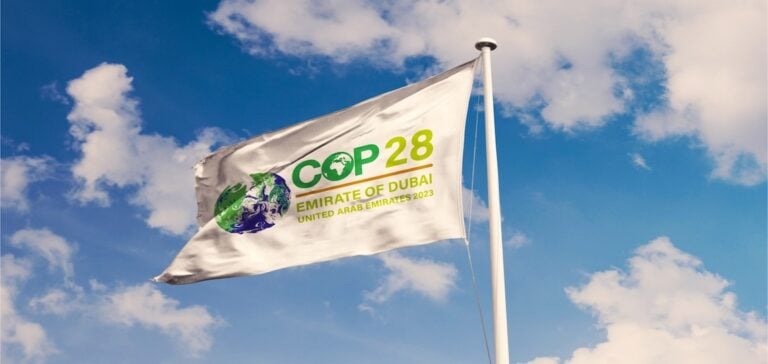Sultan al-Jaber, the Emirati chairman of the most important international climate conference since the one that delivered the Paris Agreement, has a simple answer when asked when the world will burn its last drop of oil: when there is enough low-carbon energy to replace it.
COP28: the need for a gradual transition to low-carbon energies
“We can’t put an end to the current energy system before we’ve built the energy system of tomorrow,” he replied in an interview with AFP in Brussels.
In a speech to European and Chinese ministers at COP28, which opens in Dubai on November 30, the Emirati oil company boss outlined his objectives for the first time.
To those who hope that the world will call for an exit from oil and gas, he replies that their reduction is “inevitable” and “essential”, but that realism forbids doing without them overnight. He even talks about an energy “shortage” at the moment. “We have to keep in mind that 800 million people don’t have access to electricity today”, he says, “we don’t want to create an energy crisis”. “I don’t have a magic wand, and I don’t want to invent dates that aren’t justified,” he points out, assuring us that no one is in a position to put forward a precise date for phasing out fossil fuels.
COP28 President’s pragmatic vision: expertise in fossil and renewable energies
The reasoning is pragmatic for the man who is both an expert in fossil fuels and renewable energies, as head of the national company Adnoc, and founder of the national renewable energies company, Masdar. Sultan al-Jaber, who has also led his country’s delegation at a dozen COPs, vehemently rejects recurring accusations of environmentalist bias, as Adnoc plans to develop new oil fields.
“It’s not a conflict of interest, it’s our common interest to have someone who comes from business,” he continues, noting that he is COP’s first patron president. “It’s even motivating, to prove to the world that someone with my experience can come up with something completely different”.
The ambitious objectives of COP28: towards a global energy transition and concerted action
On Thursday, he unveiled objectives that seem to outline the framework for a major agreement at COP28, for which he clearly wants to renew the genre. The last two editions have ended in a diplomatic pugilism between those who want to see a move away from fossil fuels and the oil-producing countries of the Gulf and the United States. He wants to combine the commitments of States under the aegis of the UN with those of industry and the private sector, which he intends to give a large place to in Dubai. He expects 70,000 participants, twice as many as past major COPs.
“We must do everything we can to keep the 1.5°C within reach”, insists Sultan al-Jaber, referring to the maximum warming target set by the Paris Agreement. “I have no doubt that we will be able to produce a concrete result” at the end of a COP “focused on action (…) and supported by the private sector and private capital”. Among the concrete targets proposed on Thursday: triple the world’s renewable energy capacity to 11,000 gigawatts by 2030, double energy efficiency improvements by 2030, and double hydrogen production by 2030. Targets to which the European Union, which almost slammed the door on COP27 in Egypt, is already largely committed.
The key role of pre-COP28 climate commitments: Sultan al-Jaber’s call for stronger action
“I’m very optimistic,” sums up Sultan al-Jaber, who sprinkles his words with “results”, “actions” and “key performance indicators”. The 49-year-old engineer also unhesitatingly defends nuclear power: “a safe, sustainable, low-carbon source of electricity, which can be a very robust bridge in this transition”.
For the first time, a global assessment of countries’ climate commitments, due in September, will precede the COP. We already know what it will conclude: despite all the grand promises of carbon neutrality, the plans actually adopted are insufficient to limit global warming. Sultan al-Jaber, always keen to be seen in action, therefore wrote on Thursday to all the countries taking part in the COPs, publicly calling on them to revise their climate plans upwards “by September, to bring them into line with the Paris Agreement”.
The same day, the United Arab Emirates published their own updated plan. In a few days’ time, the experts at Climate Action Tracker will say whether this improves the Emirates’ rating, which until now has been in the “highly unsatisfactory” category.






















